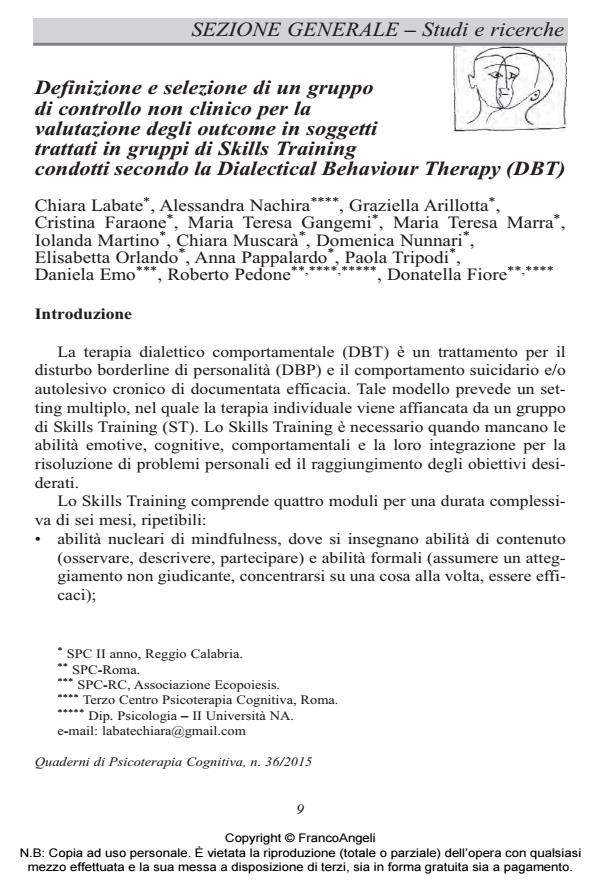Definition and selection of a non-clinical control group for an outcome evaluation of subjects included in Dialectical Behaviour Therapy (DBT) Skills Training Groups
Journal title QUADERNI DI PSICOTERAPIA COGNITIVA
Author/s Chiara Labate, Alessandra Nachira, Graziella Arillotta, Cristina Faraone, Maria Teresa Gangemi, Maria Teresa Marra, Iolanda Martino, Chiara Muscarà, Domenica Nunnari, Elisabetta Orlando, Anna Pappalardo, Paola Tripodi, Daniela Emo, Roberto Pedone, Donatella Fiore
Publishing Year 2015 Issue 2015/36
Language Italian Pages 15 P. 9-23 File size 176 KB
DOI 10.3280/QPC2015-036002
DOI is like a bar code for intellectual property: to have more infomation
click here
Below, you can see the article first page
If you want to buy this article in PDF format, you can do it, following the instructions to buy download credits

FrancoAngeli is member of Publishers International Linking Association, Inc (PILA), a not-for-profit association which run the CrossRef service enabling links to and from online scholarly content.
in treatment to evaluate outcome. The possibility to have non-clinical subjects baseline values about the emotional, social abilities and the symptomatology allows us a statistic valuation of outcome in treated subjects not only in relationship with different training phases but also with the referred normal population. Starting from dbt-skills groups socialdemographic characteristics, it was been selected a control group about 100 non-clinical subjects matched with age, gender, marital status and qualification equal to clinical sample. The same tests have been used for both clinical and non-clinical groups. We have measured: auto-efficacy in emotional regulation (APEP/APEN), temperamental characteristics (TCI-R), psychic symptomatology (SCL-90R), interpersonal abilities (IIP), alexitimia (TAS-20). The outcomes have been compared with Borderline Personality Disorder subjects scores (recruited from Terzocentro di Psicoterapia Cognitiva in Rome) in assessment and after 6 and 12 months from the training starting. At the end of 6 months training, dbt-skills groups are able to have emotional regulation and problem-solving capabilities equal to non-clinical subjects.
Keywords: DBT-skills, Borderline Personality Disorder, emotional regulation, problemsolving, interpersonal abilities.
Chiara Labate, Alessandra Nachira, Graziella Arillotta, Cristina Faraone, Maria Teresa Gangemi, Maria Teresa Marra, Iolanda Martino, Chiara Muscarà, Domenica Nunnari, Elisabetta Orlando, Anna Pappalardo, Paola Tripodi, Daniela Emo, Roberto Pedone, Donatella Fiore, Definizione e selezione di un gruppo di controllo non clinico per la valutazione degli outcome in soggetti trattati in gruppi di Skills Training condotti secondo la Dialectical Behaviour Therapy (DBT) in "QUADERNI DI PSICOTERAPIA COGNITIVA" 36/2015, pp 9-23, DOI: 10.3280/QPC2015-036002